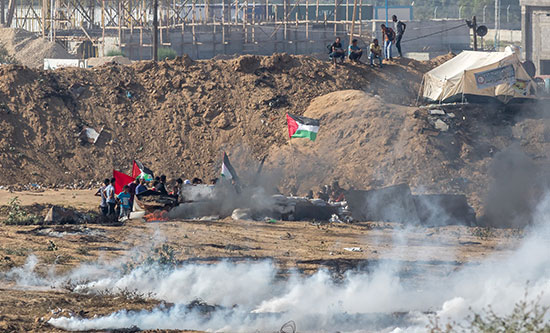
On 12 November, Israel broke a months-long ceasefire with the Gaza Strip by launching a missile strike on the home of a leader of Islamic Jihad, Baha Abu Al Ata, killing him and his wife. Israel followed this with an attack on another Islamic Jihad leader in Damascus, Akram Al Ajouri, which killed him along with his son and another civilian. This was the beginning of a 48-hour Israeli bombing campaign against the Gaza Strip, to which Palestinian fighters responded with rocket fire. The fighting ended with a truce on 14 November.
34 Palestinians were killed, including eight children. Nearly half of those killed were civilians. Among those were three members of the Ayyad family, including a seven-year-old boy, who were targeted as they rushed to hospital to see one of their relatives who had been injured in another attack. Israel intensified its bombardment immediately before the truce, killing eight members of one family, including five children, in a single attack. Israel fired four missiles at two houses owned by the family, which had been built out of tin sheets (Israel’s siege on Gaza has restricted building materials for years). No Israelis were killed or injured in the fighting, though Israeli media reported that a few people had been treated for ‘anxiety’.
These death tolls reflect the imbalance between Israel, with the most powerful military in the region, and the people of Gaza, who continue to suffer under a crushing Israeli siege with little means of defending themselves. Yet despite this, the British government issued a statement condemning ‘the firing of rockets at civilian populations’ – a reference to Palestinian retaliation – while saying nothing about Israel’s missile attacks. The EU made a similar statement, singling out rocket fire for condemnation and making no direct mention of Israel’s aggression. US Vice President Mike Pence tweeted: ‘America strongly affirms Israel’s right to defend itself.’ These imperialist nations have always supported the Israeli state with little or no criticism of its human rights violations against Palestinians.
US support for Israel’s atrocities was further highlighted on 18 November when the Trump Administration announced it no longer viewed Israeli settlements in the occupied Palestinian West Bank as illegal under international law, reversing decades-old US policy on the issue. Over 600,000 Israelis live in settlements in the West Bank. These settlements are indeed illegal under international law, which forbids transferring a state’s own population into an occupied territory. Palestinians responded by calling a ‘day of rage’ on 26 November. Thousands of Palestinians came out across the West Bank to protest against the US decision. Israeli forces sought to repress the protests, using tear gas and rubber bullets and injuring over 70 Palestinians. While no US administration has ever seriously opposed Israeli settlements, this policy shift signifies the Trump Administration’s willingness to openly endorse Israeli violations of international law – a willingness which serves to embolden the apartheid state.
Israeli political crisis
The attack on Gaza came amid an intense political crisis which has gripped the Israeli state following September’s parliamentary election. This was the second election this year, which like the first one has at time of writing proved inconclusive. Incumbent Prime Minister Benjamin Netanyahu, head of the ruling Likud Party, and Benny Gantz, who heads the rival Blue and White Coalition, both failed to cobble together a coalition that could form a new government, which could lead to an unprecedented third election in less than a year.
Alongside this, Netanyahu is personally beset by what some are calling the most intense political crisis ever faced by an Israeli Prime Minister. On 21 November, Israel’s Attorney General served three indictments on Netanyahu for charges of bribery, fraud, and breach of trust, the culmination of a high-profile three-year corruption investigation. Netanyahu is accused of accepting hundreds of thousands of dollars’ worth of bribes and promising advantageous legislation to Israeli media moguls in exchange for positive news coverage. The writing is on the wall for Netanyahu, but he will not go down without a fight. It is suspected that if he manages to head a functional government again he will use his position to pass legislation granting him immunity from prosecution. The attack on Gaza fits neatly into Netanyahu’s desperate efforts at political survival. Netanyahu knows that the violent suppression of Gaza is one thing that bridges all political divides in Israel.
Gantz has expressed his openness to forming a governing coalition with Likud, on one condition: that it exclude Netanyahu. The fact that Netanyahu has not yet been ousted is testament to the grip he has on his own party and Israeli public opinion. Netanyahu built his career on the ruthlessness with which he has crushed any Palestinian resistance. With Israel finding itself increasingly unchallenged in its oppression of Palestinians and with the unconditional backing of the US and other imperialist powers, that ruthlessness makes him ideal to lead the apartheid state, which he has already done for 13 years. But even if Netanyahu goes, the violence and racism that he embodied will remain inherent features of Israeli politics.
Wesam Khaled
Fight Racism! Fight Imperialism! 273 December 2019/January 2020




